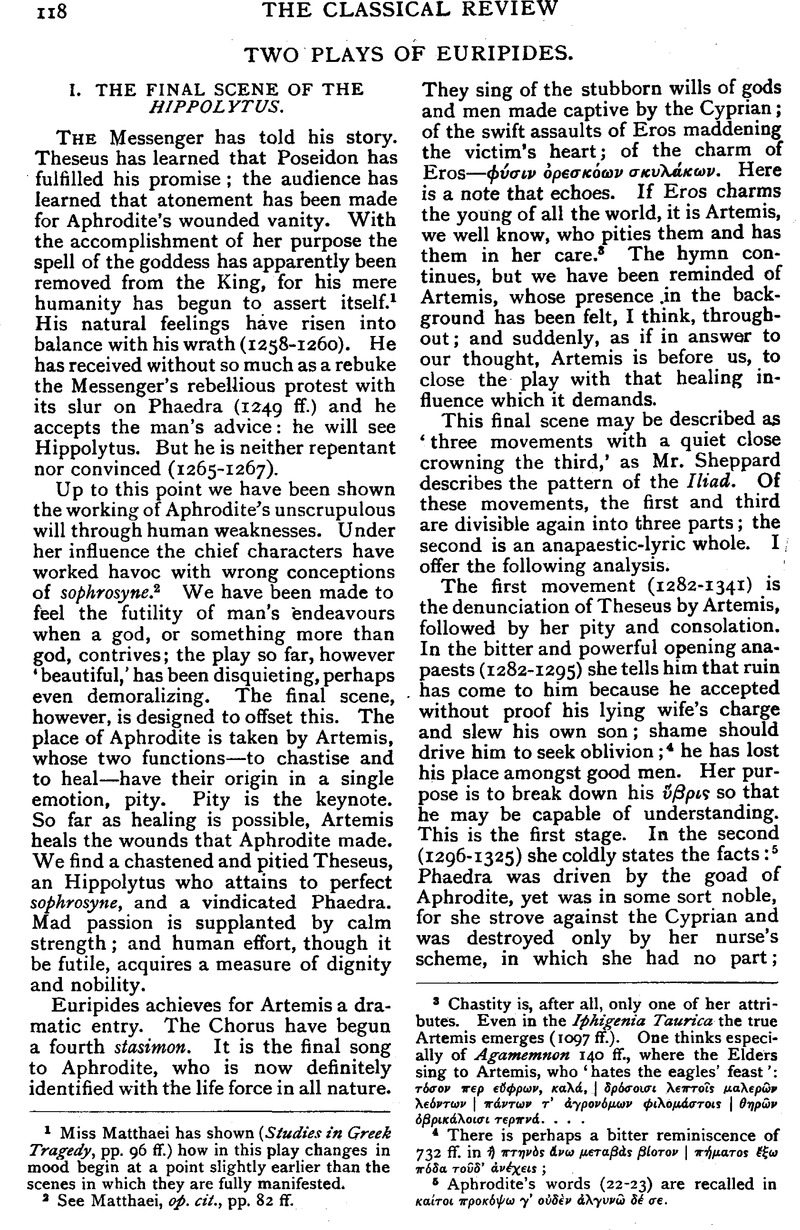Article contents
Two Plays of Euripides
Published online by Cambridge University Press: 27 October 2009
Abstract

Information
- Type
- Review Article
- Information
- Copyright
- Copyright © The Classical Association 1935
References
page 118 note 1 Miss Matthaei has shown (Studies in Greek Tragedy, pp. 96 ff.) how in this play changes in mood begin at a point slightly earlier than the scenes in which they are fully manifested.
page 118 note 2 See Matthaei, op. cit., pp. 82 ff.
page 118 note 3 Chastity is, after all, only one of her attributes. Even in the Iphigenia Taurica the true Artemis emerges (1097 ff.). One thinks especially of Agamemnon 140 ff., where the Elders sing to Artemis, who ‘hates the eagles' feast’: ![]() .
.
page 118 note 4 There is perhaps a bitter reminiscence of 732 ff. in ![]()
page 118 note 5 Aphrodite's words (22–23) are recalled in καίτοι προκὸψω γ' οὐδὲν ἀλγυνῶ δέ σε.
page 119 note 1 Her first words I take to be not a threat but a promise.
page 119 note 2 Vv. 1060–1063. He has already given his real reason, v. 1033.
page 120 note 1 Orestes and Electra share, I think, the vices of cowardice and selfishness. Electra's cowardice is shown in the passage 215 ff., and her selfishness in the fact that she puts her own ills first (e.g., 300 ff., 503 ff., 685 ff.). It is arguable, however, that this ‘cowardice’ is but emphasis on her ‘femininity.’
page 120 note 2 Euripides is apt to dramatize the obvious in legend. This leads to ‘psychological drama,’ and as a result his plays sometimes, as here, turn on human weakness (in contrast with those of Sophocles, which turn on human strength).
page 120 note 3 It is Electra attacking the evidence, not Euripides attacking the Choephoroe.
page 121 note 1 Though the Old Man is undoubtedly an ‘evil genius,’ he is not to be held responsible for all this.
page 121 note 1 The arrangement of speakers in 959–66 should not be altered; 963 is so clearly Orestes' verse.
page 121 note 3 It is no accident that Electra unconsciously points a contrast when she describes Orestes and Pylades as coming out of her house λαιψηρῷ ποδί (549 ; cf. 439, 451); nor that the Messenger refers to the Gorgon's head (856). Yet it has actually been suggested that Euripides ‘nods’ at the latter place, since it is not Aegisthus' head only, but his whole corpse, that is after wards brought in!
- 1
- Cited by

